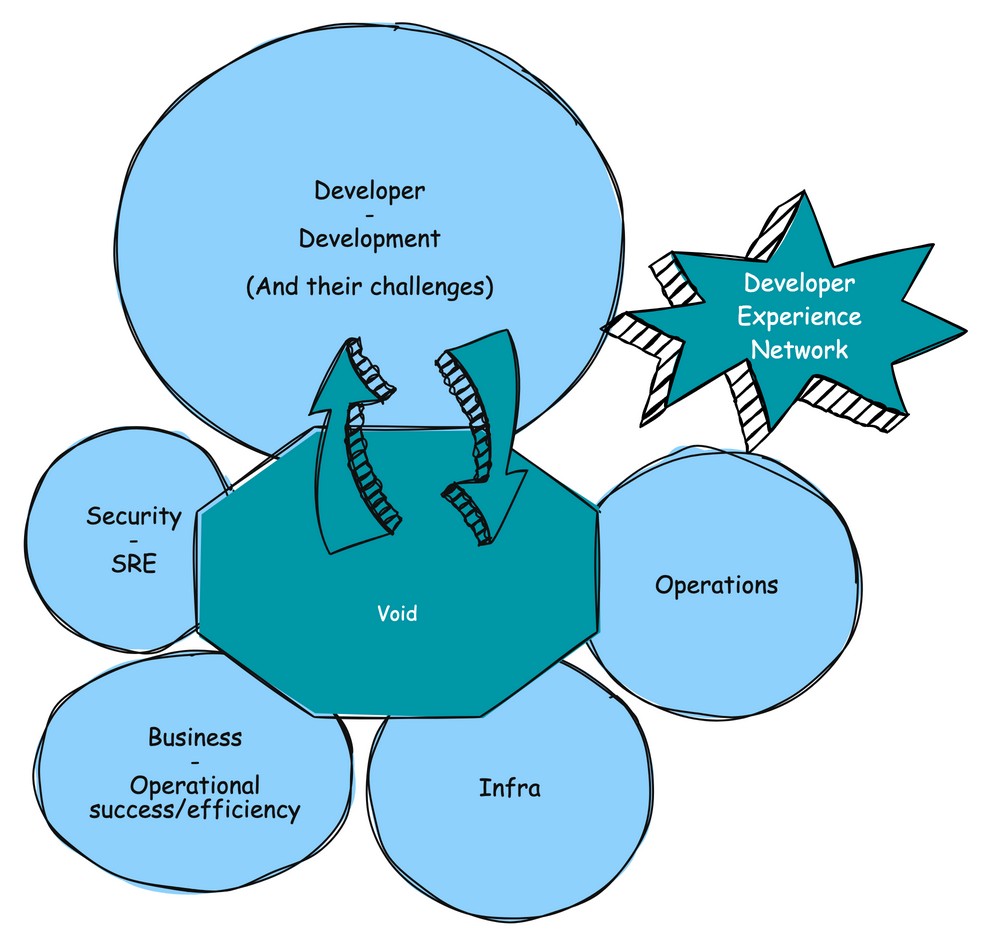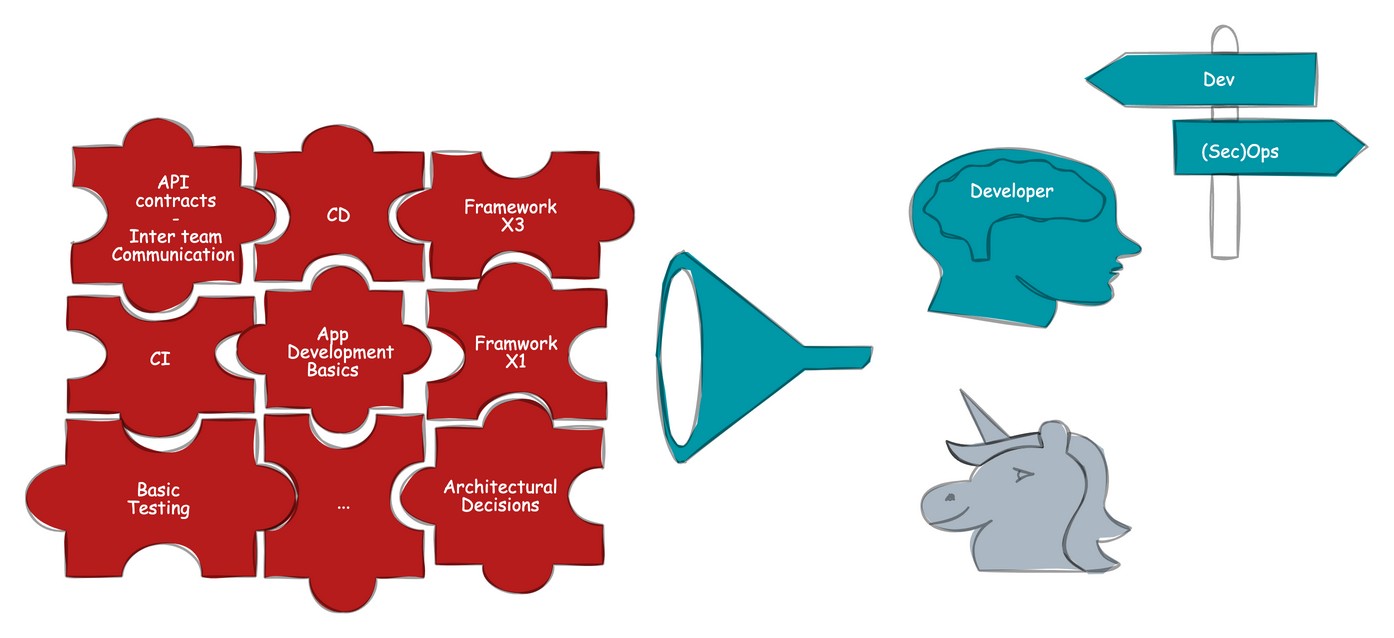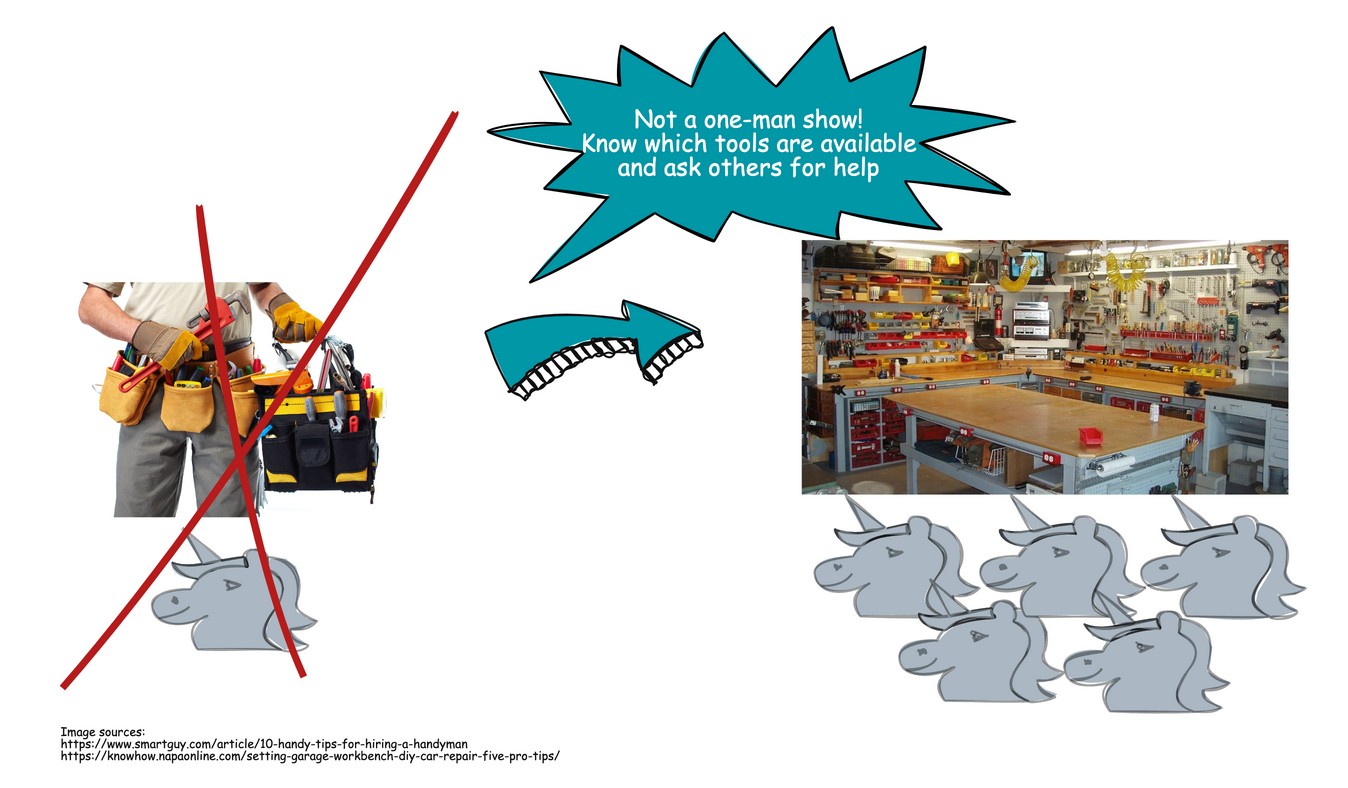Manifest
Manifest
Table of Contents
- Belgian Developer Experience Network - Manifest
Mission statement
We hereby establish this Community Manifesto as a testament to our commitment to build, nurture, and sustain “Developer Experience Network” for the benefit of all its members and the broader objectives we collectively serve. This document outlines the principles of conduct, collaboration, and governance that will guide our actions and interactions within this community.

Nowadays, developers have a huge number of responsibilities. These encompass crucial decisions such as selecting and implementing appropriate CI/CD tooling, choosing optimal runtimes like SpringBoot, Micronaut, Quarkus, and making informed choices regarding libraries, including logging libraries, tracing libraries, and utilities. Additionally, developers are tasked with determining the suitable database technology for their applications, devising sound software architectures, crafting test architectures, implementing diverse test scenarios, and staying abreast of the dynamic landscape of software development. In summary, the scope of responsibilities is extensive.

Moreover, organizations frequently maintain compartmentalized structures, a legacy from previous eras characterized by distinct departments such as operations, infrastructure, multiple development units, a board of architects, and potentially a security team. These entities function as individualized teams, often relying on communication through ticketing systems such as Jira or ServiceNow. The transition to cloud computing has introduced a collaborative synergy encompassing infrastructure, operational components, security, and application development based on technology. However, this synergy has been historically absent in team structures, resulting in a noticeable gap.
The Developer Experience Network represents an initiative aimed at bridging existing gaps by fostering communication between silos, always viewing matters through the lens of a developer. Some examples are:
- Why an immutable cluster? (It is not that the organization doesn’t trust their developers).
- Why universal base images instead of Docker Hub images?
- Why zero-trust networks?
- What is the added value of something like Backstage?
It is noteworthy that not all discussions within the group are centered around infrastructure, operations, or security. Purely developer-centric topics, such as updates in Java x and proper Domain-Driven Design (DDD) implementation, will find their place within this community as well.
It is crucial to underscore that the intent is not to empower developers to undertake every task, such as installing and configuring message buses or service meshes. Rather, the emphasis is on equipping developers with knowledge about existing tools, enabling them to make informed decisions and collaborate with other teams for successful implementations.

Values
Our community is founded on the following core values:
- Respect:
We commit to fostering an environment of mutual respect, where every voice is heard, and every contribution valued. - Integrity:
We pledge to act with honesty, transparency, and accountability in all our dealings. - Collaboration:
We believe in the power of partnership and collective action to achieve our goals. - Innovation:
We encourage creativity, experimentation, and the pursuit of excellence. - Inclusivity:
We are dedicated to building a welcoming and diverse community, where everyone has the opportunity to learn, contribute, and grow.
Rules of engagement
As part of our commitment to creating an inspiring, respectful, and inclusive environment, we’ve established a set of rules of engagement. These guidelines are in place to ensure our meetups and related activities provide a rewarding experience for all participants. Whether you’re here to learn, share, network, or simply meet like-minded individuals, these rules are designed to foster a positive community spirit.
By participating in the Developer Experience Network, you agree to follow these rules of engagement.
Our goal is to ensure that every member feels valued, respected, and supported. Together, we can
create a vibrant, engaging, and inclusive community.
Participation
- Be Active:
Engage with the community. Your contributions help us grow and thrive. Feel free to share your knowledge, ask questions, and provide feedback. Not actively participating within the steering committee can lead towards exclusion. - RSVP with Integrity:
If you’ve confirmed attendance, do your best to show up. Time is precious, and it can be inconvenient for noticing late that a meeting can’t occur due to limited show-ups. If you can’t make it, please update your RSVP status as soon as possible.
Respect and Inclusivity
- Respect Diversity:
Our community is a tapestry of individuals from varied backgrounds, professions, and life experiences. Embrace the diversity, and respect everyone’s opinions, beliefs, and personal boundaries. - Inclusive Language:
Use language that is welcoming and inclusive. Avoid expressions that could be considered offensive or exclusive based on race, gender, ethnicity, religion, sexual orientation, disability, or socioeconomic status.
Communication
- Listen Actively:
Good communication starts with listening. Give your full attention to the speaker, whether during a presentation or a one-on-one conversation. This respect fosters a positive exchange of ideas. - Constructive Feedback:
Feedback is invaluable, but its delivery matters. Offer feedback in a constructive, positive manner, focusing on the idea rather than the individual.
Networking and Privacy
- Networking with Respect:
While networking is encouraged, respect the privacy and preferences of others. Not everyone may be looking for networking opportunities. Consent is key—ask before exchanging contact information. - Privacy and Confidentiality:
Respect the confidentiality of discussions, especially if sensitive topics are shared. What’s discussed in our meetups should stay within the community unless explicit permission is given.
Digital Conduct
- Online Etiquette:
Treat each other with respect and kindness in our digital spaces, just as you would in person. Harassment, bullying, and derogatory comments are not tolerated. - Photo and Video Courtesy:
Always ask for consent before taking photos or videos during meetups, especially if the content will be shared publicly.
Conflict Resolution
- Addressing Issues:
Should conflicts arise, address them directly with the individuals involved in a respectful and private manner. If resolution cannot be achieved, seek assistance from a community organizer. - Community Support:
Our organizers are here to help mediate conflicts and ensure the community remains a welcoming space for all. Don’t hesitate to reach out with concerns or issues.
Commitment to Community
- Support and Elevate:
Look for opportunities to support and elevate your fellow members. Whether it’s through mentorship, sharing opportunities, or providing a listening ear, small acts of kindness contribute to our community’s strength. - Constructive Community:
This is a community where we will collaborate beyond the borders of our organizations. It will not be tolerated that one of the participants is abusing this community, these events or platforms to gain personal benefit in favor of the other members.
Steering committee
The community will be guided by a Steering Committee, which is responsible for strategic decision-making, oversight, and ensuring the community’s alignment with our shared vision and mission.
As a lot of meetup scenes have a hard time to start up in Belgium, the success of this community will fail or succeed depending on the member buy-in and involvement. This will be crucial within this story, so the member organizations will be playing a key role within this steering committee/community.
Community
Topic subjects
- Development
- Architecture
- Operations
- Infrastructure
- Security
- SRE
- Business
- AI
- Communication (strategies) - Culture
Topic criteria/content
As we are aiming for a broad and inclusive community, the topics should be generic and open to diverse
technologies and approaches. There should be room for discussing various platforms, frameworks, and
tools, fostering open discussions on a wide range of subjects. We should ensure that no single
organization or solution dominates the conversation, encouraging diversity of thought and experience.
The focus should remain on providing value to developers through technical discussions, avoiding
commercial or promotional content from the partners involved in the community. This is a space for
developers, not a commercial platform.
A second focus point should be, that we don’t only target sessions on state-of-the-art technologies and frameworks: e.g., service mesh is cool, but a lot of organizations are still deploying monolithic applications on web servers. We should bring messages about the real world, the world where organizations are today. E.g., Java 11 end-of-life, how to migrate, how to modernize a monolithic application, …?
Summary
- Not commercial.
- Should have technical relevance and added value.
- Mainly realistic topics, not only state-of the art.
- Functional - not product related (e.g., streaming advantages instead of Kafka seller x).
Target audience
- Developers (primary target audience):
Topics should be presented to bring a message towards developers, meaning e.g., not too deep into infra or business vocabulary and explaining concepts that seem obvious. - Architects (secondary target audience):
The secondary focus group should be architects, being a wide range of roles (e.g., platform architect, software architect, enterprise architect, …)
Knowledge gathering and sharing focus
Within the starting partner community group, a Steering Committee will be formed. This committee will be tasked to provide valuable topics, routes to community but is also able to take these topics into its own inner group in order to build up the needed expertise that over time can be shared with the other members of the group and needs to finally result in sharing this knowledge and findings with the wider community. This could be referred to as the inner workings of the Developer Experience Network that has the focus on:
- Cooperation between the participating partners (Focus on tech and best practices)
- Build knowledge from within (partner initiatives)
- Share knowledge early (partner gatherings)
- Provide content and feedback to the wider community (meetups)